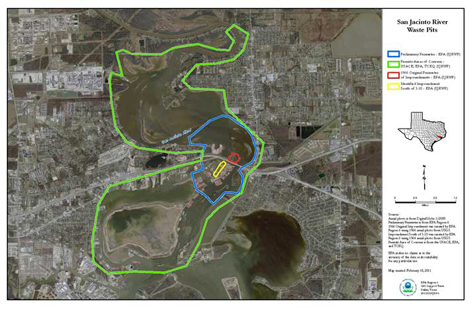© 2014 The Texas Lawbook.
By Mark Curriden – (November 3) – In 1965, the Houston Astrodome opened, Sonny and Cher appeared for the first time on TV, the Beatles topped the record charts and the first Ford Mustang rolled off the assembly line.
It also was the year that Champion Paper hired McGinnes Industrial Maintenance Corp. to dispose of tons of sludge laced with dioxin from a Houston paper mill into three pits near the banks of the San Jacinto River – a 20 acre area that the U.S. Environmental Protection Agency declared a Super Fund site in 2008.
A half-century later, Harris County is now asking a Houston jury to force three corporations – McGinnes, Houston-based Waste Management and Memphis-based International Paper – to pay more than $1 billion in penalties after toxins leaked from the pits and contaminated the area’s water. Waste Management acquired McGinnes in 2003. International Paper purchased Champion in 2000.
Harris County officials say the companies knew the environmental dangers of the waste dumps for decades but took no actions preventing the toxins from infiltrating the water and warned no one about the public health risks.
Lawyers for the companies argue that all environmental laws and guidelines were followed in 1965, that state and local officials approved of the dumpsite 50 years ago and that the defendants have been assisting the federal government with clean up costs.
Environmentalists and business interests view the case as a potential landmark. Businesses fear that other Texas counties will follow Harris County’s lead if the plaintiff is successful.

In its lawsuit, Harris County said the companies violated state environmental laws that require that offenders pay daily penalties of up to $25,000. The county contended that the defendants should pay the penalties for each of the three waste pits, which could have led to several billion dollars in fines.
But last week, Texas District Judge Caroline Baker gave the companies a huge victory when she ruled that the defendants could only be penalized for one of the three pits, which limited the potential financial exposure of the companies to slightly more than $1 billion.
Testimony is scheduled to continue this week. Closing arguments are expected the week of Nov. 11.
The trial, which is now in its third week of testimony, features some of Houston’s premier courtroom litigators.
“Harris County told them not to let the waste get into the river and then [the companies] left their sludge in the waste pits and abandoned them for 40 years,” Earnest Wotring, a Houston lawyer representing Harris County, told the jury during opening statements.
“Defendants didn’t warn anyone about the hazardous dioxin in their sludge,” said Wotring, a partner at Houston-based Connelly Baker Wotring. “Defendants did nothing to stop their sludge laced with dioxin from getting into the river. Under Texas law, defendants are responsible for the daily pollution of the San Jacinto River with paper mill sludge containing the hazardous substance.”
Paula Hinton, a lawyer for McGinnes, told jurors that Harris County’s lawsuit was nothing more than “the old waste pit lottery.” She said the county is falsely contending that the defendants “dumped the material and abandoned it in the dark of the night.

“Don’t let anybody tell you that this was a fly-by-night operation where they were slipping waste out the back door and dumping it down the drain or onto somebody else’s property,” she said.
“Waste Management of Texas could not have changed some behavior or done something differently because we didn’t come along until 2003,” Barrett Reasoner, a lawyer for Waste Management, told jurors. “It was not until 2005 that Waste Management had any knowledge about the existence of this site.
“Nobody in this case is ever going to suggest that Waste Management of Texas had anything to do with generating this waste, selecting the location for this impoundment, constructing this site or disposing of the waste in anyway, shape or form,” said Reasoner, who is a partner with Gibbs & Bruns in Houston.
Reasoner told jurors that Harris County is simply “trying to find another deep pocket to recover money.” The allegation, he said, “really stretches the imagination to the breaking point.”
Winn Carter, a partner at Morgan Lewis who is representing International Paper, said his client is “part of the solution through the Superfund process to a probem that it did not create.” The companies have contributed tens of millions of dollars to the EPA’s efforts to clean up the site.
“We’re not going to stand here and tell you that you should go sprinkle dioxin on your cereal,” Hinton told jurors. “The right thing is being done by IP and MIMC in working with the federal government, cleaning up and remediating this site.
“The right thing is not to have Harris County and the state come in 50 years after the fact and attempt to get billions in penalties, when the evidence will show they knew about this site,” she said.
© 2014 The Texas Lawbook. Content of The Texas Lawbook is controlled and protected by specific licensing agreements with our subscribers and under federal copyright laws. Any distribution of this content without the consent of The Texas Lawbook is prohibited.
If you see any inaccuracy in any article in The Texas Lawbook, please contact us. Our goal is content that is 100% true and accurate. Thank you.
